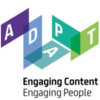- Have full autonomy to develop a novel proposal aligned with your research career guided by a world leading academic supervisor in your field and an expert research development team
- Join the Marie Curie Alumni Association, a major platform for researchers to contribute to shaping science policy in Europe, providing career development opportunities and supporting the wider research community on topics affecting research and researchers' lives.
- Expand the reach of your research through the MSCA programme which is proven to increase citation publication rate in comparison to other schemes
- Be provided with a generous Mobility and Living Allowance as well as a Family Allowance (where applicable) to enable your relocation to Ireland, the European hub of digital innovation.
- C ontribute to the ADAPT research agenda that pioneers and combines research in AI driven technologies: Natural Language Processing, Video/Text/Image/Speech processing, digital engagement & HCI, semantic modeling, personalisation, privacy & data governance.
- Work with our interdisciplinary team of leading experts from the complementary fields of, Social Sciences, Communications, Commerce/Fintech, Ethics, Law, Health, Environment and Sustainability.
- Leverage our success. ADAPT's researchers have signed 43 collaborative research projects, 52 licence agreements and oversee 16 active commercialisation funds and 52 commercialisation awards. ADAPT has won 60 competitive EU research projects and obtained €35 million in non-exchequer non-commercial funding. Additionally, 9 spinout companies have been formed. ADAPT's researchers have produced over 1,500 journal and conference publications and nearly 100 PhD students have been trained.
MSCA Postdoctoral Fellowships 2024 - Dublin, Ireland - ADAPT Centre

Description
The ADAPT Centre is excited to invite expressions of interest for the competitive and career enhancing 2-year European Postdoctoral Fellowships (PF), a Horizon Europe Marie Skłodowska-Curie Action.
We invite applications from from experienced researchers in the areas of Human Centred AI, e-Health, Blockchain, Disinformation, Cybersecurity, Natural Language Processing, Large Language Models, Data Analytics, Artificial Intelligence, Machine Learning, Human Computer Interaction, Linguistics, Generative AI, Data Governance, Ethics, Edge Computing, geoAI, Knowledge & Data Engineering, Health Informatics, Digital Humanities, Information Retrieval, Privacy, Network Security, Speech, Semantic Web Technologies, eXtended Reality, Personalisation, Computer Graphics, Standardisation and Deep learning.
ADAPT's world-leading academics looking to supervise fellows can be found at the end of this document – click HERE to read about our experts.
As part of this prestigious Postdoctoral Fellowship you will
Submit an Expression of Interest
Learn more about the Scheme
Why ADAPT?
About the ADAPT Centre
The ADAPT Centre, funded by Science Foundation Ireland, focuses on developing next generation digital technologies that transform how people communicate by helping to analyse , personalise and deliver digital data more effectively for businesses and individuals. ADAPT researchers are based in eight leading universities: Trinity College Dublin, Dublin City University, University College Dublin, Technological University Dublin, Maynooth University, Munster Technological University, Technological University of the Shannon: Midlands Midwest, and the University of Galway.
ADAPT's research vision is to pioneer new forms of proactive, scalable, and integrated AI-driven Digital Media Technology that empower individuals and society to engage in digital experiences with control, inclusion, and accountability with the long-term goal of a balanced digital society by 2030. ADAPT is pioneering new Human Centric AI techniques and technologies including personalisation, natural language processing, data analytics, intelligent machine translation, human-computer interaction, as well as setting the standards for data governance, privacy, and ethics for digital content.
